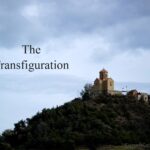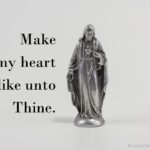
Jesus Christ is true God and true man. As a man, He has a real family tree filled with generations of real people from salvation history.
Genealogies establish identity through bloodlines but genealogies in the Bible are not always biological. A character in the Bible can have more than one genealogy depending on the intent. Some genealogies create historical periods and others establish legal authority to rule for certain people.
Both Matthew and Luke include the long history of the Messiah over many generations.
Matthew traces Jesus’ ancestry from Abraham, the father of the Jewish nation, showing that He is the rightful heir of the throne of David.
To emphasize Jesus’ connection to the entire human race and the universality of the Gospel message, Luke follows his genealogy all the way back to Adam, father of all mankind.
Jesus’ family tree includes Jews and Gentiles, men and women, and saints and sinners demonstrating that God can work through all people.
An artistic expression of the genealogy of Jesus:
Jesus is part of history:
The continuity of Jesus in the tradition of Israel:
The book of the genealogy of Jesus Christ, the son of David, the son of Abraham. Abraham became the father of Isaac, Isaac the father of Jacob, Jacob the father of Judah and his brothers. Judah became the father of Perez and Zerah, whose mother was Tamar. Perez became the father of Hezron, Hezron the father of Ram, Ram the father of Amminadab. Amminadab became the father of Nahshon, Nahshon the father of Salmon, Salmon the father of Boaz, whose mother was Rahab. Boaz became the father of Obed, whose mother was Ruth. Obed became the father of Jesse, Jesse the father of David the king. David became the father of Solomon, whose mother had been the wife of Uriah. Solomon became the father of Rehoboam, Rehoboam the father of Abijah, Abijah the father of Asaph. Asaph became the father of Jehoshaphat, Jehoshaphat the father of Joram, Joram the father of Uzziah. Uzziah became the father of Jotham, Jotham the father of Ahaz, Ahaz the father of Hezekiah. Hezekiah became the father of Manasseh, Manasseh the father of Amos, Amos the father of Josiah. Josiah became the father of Jechoniah and his brothers at the time of the Babylonian exile. After the Babylonian exile, Jechoniah became the father of Shealtiel, Shealtiel the father of Zerubbabel, Zerubbabel the father of Abiud. Abiud became the father of Eliakim, Eliakim the father of Azor, Azor the father of Zadok. Zadok became the father of Achim, Achim the father of Eliud, Eliud the father of Eleazar. Eleazar became the father of Matthan, Matthan the father of Jacob, Jacob the father of Joseph, the husband of Mary. Of her was born Jesus who is called the Messiah. Thus the total number of generations from Abraham to David is fourteen generations; from David to the Babylonian exile, fourteen generations; from the Babylonian exile to the Messiah, fourteen generations.
Matthew 1: 1-17
There from the beginning:
Not the first genealogy in the Bible:
The Word became flesh so that thus we might know God’s love: “In this the love of God was made manifest among us, that God sent his only Son into the world, so that we might live through Him.” “For God so loved the world that he gave his only Son, that whoever believes in him should not perish but have eternal life.”
Catechism of the Catholic Church 458
History is messy:
Not everyone in the Bible is a hero:
A strange, dysfunctional family:
Matthew opens his Gospel with Jesus’ genealogy because he wants to put the question of Jesus’ provenance in the correct light from the very beginning: the genealogy serves as a kind of heading to the entire Gospel. Luke, on the other hand, places Jesus’ genealogy at the beginning of his public ministry, as a kind of public presentation of Jesus, in order to answer the same question with a different emphasis-in anticipation of all that is about to unfold in the rest of the Gospel.
Pope Benedict XVI, Jesus of Nazareth, 2007
Two different genealogies with two different fathers:
The Truth, Goodness, and Beauty of the Catholic Church
Racing toward truth and reality:
Share this page with friends and family to start a conversation about your faith.
Don’t miss a post. Learn more about the Catholic Church and strengthen your Catholic faith.
Find more Fiercely Catholic video issues here.
Subscribe here.


